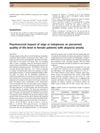8 citations,
October 2020 in “Clinical Psychopharmacology and Neuroscience” rTMS may help treat trichotillomania in some patients.
 3 citations,
June 2023 in “Journal of dermatological treatment”
3 citations,
June 2023 in “Journal of dermatological treatment” Regrowing scalp hair improves quality of life and reduces anxiety and depression in severe alopecia areata patients.
 1 citations,
August 2023 in “JAMA Dermatology”
1 citations,
August 2023 in “JAMA Dermatology” Increasing the dose of baricitinib to 4 mg helps more patients with severe alopecia areata regrow hair.
 20 citations,
March 2023 in “American Journal of Clinical Dermatology”
20 citations,
March 2023 in “American Journal of Clinical Dermatology” Baricitinib improved severe hair loss in adults over 52 weeks and was safe to use.
 3 citations,
September 2022 in “Journal of the American Academy of Dermatology”
3 citations,
September 2022 in “Journal of the American Academy of Dermatology” Baricitinib is effective and safe for severe alopecia areata, working similarly with or without an atopic background.
July 2022 in “Journal of Investigative Dermatology” Scalp clarifying shampoo can help reduce hair loss and improve hair volume.
 3 citations,
January 2021 in “Journal of The American Academy of Dermatology”
3 citations,
January 2021 in “Journal of The American Academy of Dermatology” Different types of atopic dermatitis were linked to specific genetic and immune changes, suggesting that severe cases might need stronger immune-targeting treatments.
 3 citations,
May 2018 in “Experimental Dermatology”
3 citations,
May 2018 in “Experimental Dermatology” Young HS patients often have other physical and mental health issues, and research on HS covers a wide range of topics including genetics, triggers, treatments, and the need for more data.
 January 2012 in “Yearbook of Dermatology and Dermatologic Surgery”
January 2012 in “Yearbook of Dermatology and Dermatologic Surgery” Acne treatment, including isotretinoin, improves quality of life and does not worsen depression.
 December 2024 in “Journal of the International Society of Sports Nutrition”
December 2024 in “Journal of the International Society of Sports Nutrition” Creatine monohydrate is safe and effective for muscle recovery and performance, especially for those with low creatine levels.
 5 citations,
May 2011 in “Movement Disorders”
5 citations,
May 2011 in “Movement Disorders” Finasteride significantly reduced tics and obsessive-compulsive symptoms in Tourette syndrome patients.
 78 citations,
February 2011 in “Canadian Medical Association Journal”
78 citations,
February 2011 in “Canadian Medical Association Journal” Acne treatment varies, with topical and systemic therapies effective, and more research needed on treatment order and long-term effects.
 9 citations,
December 2012 in “The Journal of Dermatology”
9 citations,
December 2012 in “The Journal of Dermatology” Wearing wigs or hairpieces improves self-esteem, adaptability, and competence in women with alopecia areata.
April 2016 in “The journal of investigative dermatology/Journal of investigative dermatology” The ALADIN score can predict how well patients with alopecia areata will respond to JAK inhibitor treatments.

The method creates realistic, anonymous acne face images for research, achieving 97.6% accuracy in classification.
 21 citations,
January 2021 in “Therapeutic Advances in Endocrinology and Metabolism”
21 citations,
January 2021 in “Therapeutic Advances in Endocrinology and Metabolism” Testosterone may have a dual role in COVID-19, potentially worsening outcomes in men, and testosterone therapy could help some patients, but more research is needed.
 30 citations,
April 1997 in “European journal of endocrinology”
30 citations,
April 1997 in “European journal of endocrinology” The document concludes that managing hirsutism involves identifying the cause, using a scoring system for severity, combining cosmetic and medical treatments, encouraging weight loss, and providing psychological support, while noting the need for more research on drug treatments.
 1 citations,
July 2017 in “Journal der Deutschen Dermatologischen Gesellschaft”
1 citations,
July 2017 in “Journal der Deutschen Dermatologischen Gesellschaft” Topical caffeine improves hair loss intensity, speed, and shedding, and works better with minoxidil/azelaic acid.
 19 citations,
November 2021 in “Lupus Science & Medicine”
19 citations,
November 2021 in “Lupus Science & Medicine” Black patients with discoid lupus erythematosus have more severe skin damage and higher chances of dyspigmentation, scalp, and ear involvement.
 September 2024 in “Journal of the American Academy of Dermatology”
September 2024 in “Journal of the American Academy of Dermatology” Baricitinib helps long-term hair regrowth in severe alopecia areata patients.
 September 2024 in “Journal of the American Academy of Dermatology”
September 2024 in “Journal of the American Academy of Dermatology” Continued baricitinib treatment leads to significant scalp hair regrowth in severe alopecia areata patients.
 1 citations,
June 2022 in “JAMA”
1 citations,
June 2022 in “JAMA” Baricitinib, a medication taken by mouth, was effective in regrowing hair for people with severe hair loss.
 August 2024 in “Aesthetic Plastic Surgery”
August 2024 in “Aesthetic Plastic Surgery” Exosome treatment safely increases hair density in male patients with androgenetic alopecia.
 July 2022 in “المجلة العراقية للصيدلة”
July 2022 in “المجلة العراقية للصيدلة” Azelaic acid 20% cream works well for treating scalp alopecia areata and can be an alternative to clobetasol ointment.
 January 2023 in “Al-Azhar International Medical Journal (Print)”
January 2023 in “Al-Azhar International Medical Journal (Print)” Scalp threading with PDO threads is an effective treatment for male crown baldness.
 November 2022 in “The journal of investigative dermatology/Journal of investigative dermatology”
November 2022 in “The journal of investigative dermatology/Journal of investigative dermatology” Ivermectin 1% cream effectively reduces visible and invisible symptoms of rosacea.
 20 citations,
June 2015 in “Hormone Molecular Biology and Clinical Investigation”
20 citations,
June 2015 in “Hormone Molecular Biology and Clinical Investigation” Finasteride worsens erectile dysfunction and lowers testosterone in men with enlarged prostates, unlike tamsulosin.
 June 2024 in “IP Indian journal of clinical and experimental dermatology”
June 2024 in “IP Indian journal of clinical and experimental dermatology” PRP therapy effectively treats alopecia areata and atrophic acne scars.
 29 citations,
July 2004 in “Pharmacology, Biochemistry and Behavior”
29 citations,
July 2004 in “Pharmacology, Biochemistry and Behavior” Finasteride reduces alcohol withdrawal effects, especially in female mice.
 81 citations,
June 2014 in “American Journal of Men's Health”
81 citations,
June 2014 in “American Journal of Men's Health” Finasteride can cause lasting sexual, emotional, and cognitive issues, with varying severity.


























